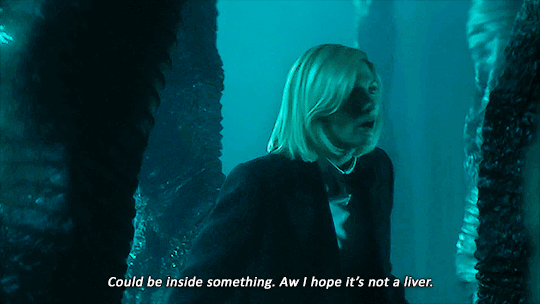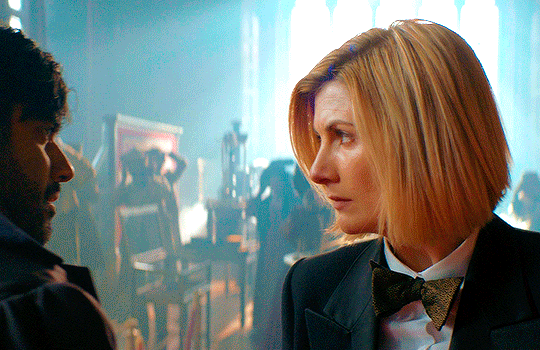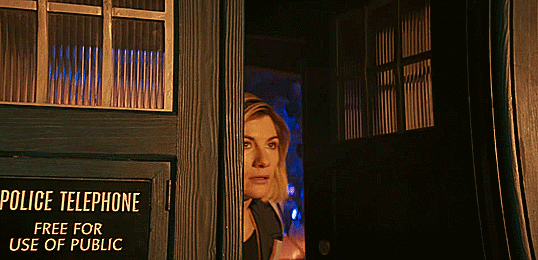We’re back to the Sunday evening schedule as Doctor Who series 12 carries on. The second episode of “Spyfall” concludes the story of Barton and the Kasaavin but it’s only the beginning for something much bigger. A chase through time, a team-up with Ada Lovelace and Noor Inayat Khan, the fam on their own, and the grim return to Gallifrey. There’s a lot to unpack here.
The Kasaavin, Barton, and “the problem with modern technology”
Before we get into the main characters and what the events of “Spyfall” mean for the future of the Whoniverse, let’s talk about monsters of the week and plot. “Spyfall” had a good setup in its first episode but between the Master revelation and everything that came with that plotline, it’s no surprise that the payoff didn’t feel quite as powerful. In a way, I didn’t even have the expectation for “Spyfall” to be a grandiose story on its own, it just needed to be good enough as a background to support its better elements. And it did, much like Chris Chibnall’s episodes last season were passable and supported the truly standout ones.
The Kasaavin are nothing groundbreaking in Doctor Who. An alien race from another dimension who want to take over the universe, not the first ones to try in the show’s 56-year-old history. Their design is interesting and makes them somewhat stand out from the imperialistic crowd but at the end of the day, they’re just not compelling enough. Working with the Master made them more threatening and intriguing by proxy but at the same time made them much less relevant than they otherwise would have been. Their realm with the DNA trees made for good visuals but otherwise, they served their purpose in the story and went no further.

Barton had the potential to really bring this story to life, as the human willing to work with an alien race to end his own home. Unfortunately, he’s easily the weakest part of the episode with a disappointingly lacking motivation and a rather laughable villain monologue. He kills his mother (or transforms into a database, I guess) so we see how corrupt and beyond saving he is. Considering that we knew basically nothing of him as a character before, this just feels like a cheap way of making him evil without hitting any emotional beats. If only we learned more about him during the interview scene in the last episode, felt a connection and maybe even sympathy for him, if only his mother had any significance in the story. She doesn’t even get a name in the credits, Blanche Williams is “Barton’s Mother” and doesn’t feel crucial in that singular role she was assigned.
But fine, villains don’t need to be incredibly complex or sympathetic to be good characters or just good vessels for their ideology. Where Barton and the story of “Spyfall” fail on another level is his ultimate goal. During his speech in London, he mocks his audience and the whole world for letting technology be a part of their daily lives. He mocks them for allowing to be spied upon, for ticking all those “I agree” boxes, he says humanity has peaked already and can now be used for storage through their DNA. Pointing out how amazing DNA is and somehow using that for villainous purposes is not a bad concept but we never find out exactly what Barton’s plan was after that. There’s the implication that his issues with his mother lead him to despise humanity but the whole story is seriously lacking in any kind of substance and so the monologue just becomes a tantrum about how “humans bad, technology better”.
What’s the moral of the story here, anyway? Not that we need a moral in every single DW episode but Chibnall was obviously going for something here. So Barton is on the side of technology and gloats that people are too naive. He’s the bad guy, though, so he doesn’t have to be a 100% right. Except, there’s this very weird, tacky line by the Doctor as she defeats the Master:
That’s the problem with modern technology: you never know when you’re being spied upon.
Technology’s bad after all, huh. And look, I know, it’s possible to balance the idea that technology is getting kind of creepy and corporations are using our data with the fact that humans are still good and not sheep and technology can still be a good thing. Such a discussion, especially as we enter 2020, needs nuance. Sadly, that’s exactly what “Spyfall” lacks. That doesn’t make the whole Kasaavin and Barton plot terrible, just passable without much substance. Luckily, there are other elements that make for a much better viewing experience.
Ada, Noor and a chase through time
The best aspect of the technology plot is that the Doctor met Ada Gordon, future Ada Lovelace because of it. Ada (Sylvie Briggs) takes the Doctor from the Kasaavin to London, 1834, but the Master finds them and chaos ensues. Sacha Dhawan unleashes the madman in the Master who delights in killing people and wants nothing more than to get the Doctor’s attention. Part two didn’t help much in determining where this Master fits into the timeline but we might find out one day where he is in relation to Missy’s redemption. For now, we’re back to the ultimate nemesis dynamic of the Doctor-Master duo that we’ve known for 49 years.
Ada helps the Doctor escape from the Master and invites herself along for the next time jump that takes them to Paris, 1943. Lucky for them, a certain British spy finds them before the Nazis can, Noor Inayat Khan (Aurora Marion). Noor hides the Doctor and Ada from the Master, who is parading around as a German officer. Here we have two amazing characters helping Thirteen out, if only we could have had even more of them in the episode. I’m not one to advocate for one-off guest stars to become companions but even Graham pointed it out that Ada and Noor looked like replacements for the fam. Not that I want them to be replaced but it couldn’t hurt to take Ada and Noor on a few more trips in the TARDIS. Don’t worry, once Big Finish starts making Thirteenth Doctor era audios I’m sure they’ll want to bring these two back for some adventures. After all, Ada Lovelace is no stranger to the medium.
Sure, the Doctor did erase their memories and there’s a discussion to be had about Doctor Who’s icky history with memory wipes. As far as the trio’s “Spyfall” adventure goes, though, it highlighted how well the Thirteenth Doctor can work with guest stars and how important historical episodes and figures are to the series. “Rosa” and “Demons of the Punjab” were the two standout episodes from last season by a very long shot and so I’m looking forward to what this season has to offer in terms of the past.
The Master’s scenes in London and Paris were all disturbing on some level. For the most part, it was the Master being himself, (re)establishing the character as the maniac who would do anything for the Doctor’s attention and showcasing Dhawan’s talent for the role. There’s a moment or two that crosses the line and becomes questionable: you can interpret both the “kneel” scene and the Doctor giving the Master to the Nazis – who is played by the first-ever non-white actor in a Time Lord role. Regardless, this is a very intense Doctor-Master dynamic we’re getting, far from the Twelfth Doctor mellowing Missy out or the deadly but surprisingly polite conflicts between the Third Doctor and Roger Delgado’s original Master. We’re in for a ride with Dhawan as the Master and I for one can’t wait to see more of him.

Gallifrey and beyond, the future of Team TARDIS
As if just returning wasn’t enough of a shock for the Master, he also comes with the news of Gallifrey’s doom (again) and the promise of something much bigger in store for the Doctor and the audience. The concept of the Timeless Child is brought back from last season’s “The Ghost Monument” as a greater arc that was teased but never elaborated upon. Well, series 12 is here to pick that up and Chibnall doesn’t pull any punches with where he wants to take Doctor Who. It’s back to Gallifrey but this is no sweet homecoming for the Doctor. The planet is in flames again and this time around it was the Master himself who ended their home planet.
Gallifrey’s had a rough time over the decades. In Classic Who it was never destroyed but some tried and more importantly the Time Lords were shown to be the greatest monsters of all (them and the Daleks). RTD came up with the idea of the Time War and got rid of Gallifrey, making its destruction a huge part of the Doctor’s identity. Enter the 50th anniversary and Moffat: Gallifrey Falls No More. Then the Twelfth Doctor finds it and it turns out, the Time Lords are still jerks! So who needs them. And now they’re gone again because apparently even the Master finds them too despicable.
The Doctor’s past certainly caught up with her and now the future of Gallifrey is in Chibnall’s hands – until another showrunner takes over, that is. Whatever happens, I’m cautiously optimistic about Chibnall’s ability to handle this arc. I wasn’t a huge fan of his episodes last season and I think it might be best if he leaves the standalones to other writers but we might just get a good larger arc from him. He might turn out to be a sort of inverse Moffat: not so great with standalone episodes but capable of putting together an intriguing and coherent overarching storyline. That’s the hope, anyway.
Last but not least, let’s not forget about Yaz, Graham, and Ryan, our Team TARDIS. They managed to stay alive on their own as the Doctor was off teaming up with Ada and Noor. It is a shame that they were stuck in the weaker Barton plot but they bonded, just the three of them without the Doctor for the first time and that was very much appreciated. It’s good to see how they deal with situations on their own and we really get a glimpse into how they come to the conclusion that they need more answers from the Doctor. She opens up ever so slightly at the very end of the episode but this is only the beginning of a new fam. Post-Master and everything else they’ve been through, the Doctor is going to have to face her past and be honest with her companions about it. And that emotional arc, if done right, is going to be poignant and just as crucial as wherever the mystery of the Timeless Child leads us.

Despite my criticism of the Barton thread, “Spyfall” is a highly enjoyable episode and a worthy conclusion to the action-packed first half. If the whole season keeps to the standard set by the two-parter then we’re in for an intense few weeks.

